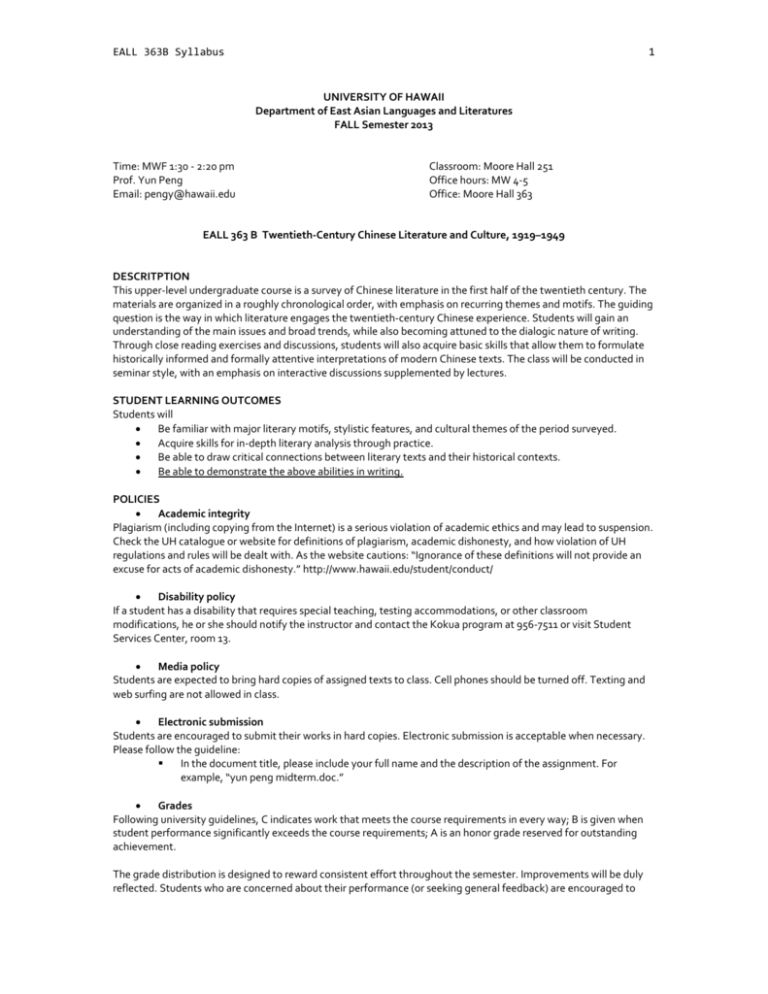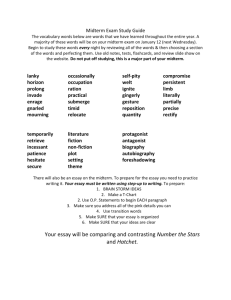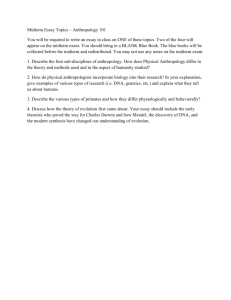EALL 363 B(Alpha) 20th-Century Chinese Literature and Culture (3
advertisement

EALL 363B Syllabus 1 UNIVERSITY OF HAWAII Department of East Asian Languages and Literatures FALL Semester 2013 Time: MWF 1:30 - 2:20 pm Prof. Yun Peng Email: pengy@hawaii.edu Classroom: Moore Hall 251 Office hours: MW 4-5 Office: Moore Hall 363 EALL 363 B Twentieth-Century Chinese Literature and Culture, 1919–1949 DESCRITPTION This upper-level undergraduate course is a survey of Chinese literature in the first half of the twentieth century. The materials are organized in a roughly chronological order, with emphasis on recurring themes and motifs. The guiding question is the way in which literature engages the twentieth-century Chinese experience. Students will gain an understanding of the main issues and broad trends, while also becoming attuned to the dialogic nature of writing. Through close reading exercises and discussions, students will also acquire basic skills that allow them to formulate historically informed and formally attentive interpretations of modern Chinese texts. The class will be conducted in seminar style, with an emphasis on interactive discussions supplemented by lectures. STUDENT LEARNING OUTCOMES Students will • Be familiar with major literary motifs, stylistic features, and cultural themes of the period surveyed. • Acquire skills for in-depth literary analysis through practice. • Be able to draw critical connections between literary texts and their historical contexts. • Be able to demonstrate the above abilities in writing. POLICIES • Academic integrity Plagiarism (including copying from the Internet) is a serious violation of academic ethics and may lead to suspension. Check the UH catalogue or website for definitions of plagiarism, academic dishonesty, and how violation of UH regulations and rules will be dealt with. As the website cautions: “Ignorance of these definitions will not provide an excuse for acts of academic dishonesty.” http://www.hawaii.edu/student/conduct/ • Disability policy If a student has a disability that requires special teaching, testing accommodations, or other classroom modifications, he or she should notify the instructor and contact the Kokua program at 956-7511 or visit Student Services Center, room 13. • Media policy Students are expected to bring hard copies of assigned texts to class. Cell phones should be turned off. Texting and web surfing are not allowed in class. • Electronic submission Students are encouraged to submit their works in hard copies. Electronic submission is acceptable when necessary. Please follow the guideline: In the document title, please include your full name and the description of the assignment. For example, “yun peng midterm.doc.” • Grades Following university guidelines, C indicates work that meets the course requirements in every way; B is given when student performance significantly exceeds the course requirements; A is an honor grade reserved for outstanding achievement. The grade distribution is designed to reward consistent effort throughout the semester. Improvements will be duly reflected. Students who are concerned about their performance (or seeking general feedback) are encouraged to EALL 363B Syllabus 2 talk to me as early as possible. Do not wait till it is too late. Once the final grades are posted, they are not negotiable unless there are errors involved. REQUIREMENTS • Attendance (5%) Students are expected to attend all classes. More than four unexcused absences will affect the final grade for the course. More than ten will result in automatic failure of the course, regardless of the student’s prior standing. Late arrivals exceeding 15 minutes will count as full absences. Excused absences, such as illness or death in the immediate family, must be documented. Airline reservations and other travel plans do not constitute excused absences. Absent students are responsible for acquiring relevant class notes and handouts from fellow students. Work assigned in a student’s absence will not be given a later deadline without prior agreement with the instructor. • Participation and quizzes (15%) I expect you to read all assigned texts with care, take notes and come to class with informed thoughts to contribute to class discussion. Pop quizzes will be given regularly. Active participation in class is encouraged and required. Disagreements are welcome, provided they are supported by thoughtful reasoning and presented in a manner respectful of others’ positions. Listening carefully and working with others in groups are also essential aspects of participation. • Analysis papers (40%) Students are required to complete four analysis papers of varying length (2-4 pages). The instructions will be handed out in advance. First: due 9/13 Second: due 9/23 Third: due 10/28 Fourth: due 11/18 • Midterm essay (20%) A five-page essay on a topic to be handed out in advance. • Final essay (20%) A six-page essay to be completed at the end of the semester. In order to receive a grade for this assignment, you must submit a draft (3-4 pages). I will comment on your draft and make suggestions for revision. The topic will be discussed in advance. EVALUATION CRITERIA • Attendance (5%) • Participation and quizzes (15%) • Four analysis papers (~12 pages) (40%) • Midterm essay (5 pages) (20%) • Final essay (6 pages with revision) (20%) REQUIRED TEXTS Chang, Hen-Shui. Shanghai Express. Honolulu: University of Hawaii Press, 1997. (ISBN-13: 978-0824818302) Lau, Joseph S. M. et al (eds.) Modern Chinese Stories and Novellas, 1919-1949. New York: Columbia University Press, 1981. (ISBN-13: 978-0231042031) Xiao, Hong. The Field of Life and Death & Tales of Hulan River. Boston: Cheng & Tsui, 2006. (ISBN-13: 9780887273926) A Course Reader is available (http://hawaii.edu/crdg/curriculum/). EALL 363B Syllabus 3 SCHEDULE i. “China” Week 1 (8/26, 8/28, 8/30) • literature & modern China • New Culture Movement Milena Doleželová-Velingerová, “The Origins of Modern Chinese Literature” Lu Xun, “Preface to the First Collection of Stories, ‘Call to Arms’” (1919) (R) *Week 2 (9/4, 9/6) • “China” • “loneliness”: self as alienation Yu Dafu, “Sinking” (1921) Week 3 (9/9, 9/11, 9/13) • the persistence of the past • “loneliness” Lu Xun, “Medicine” (1919); “My Old Home”; “In the Wine Shop” First analysis paper due on 9/13 Week 4 (9/16, 9/18, 9/20) • the persistence of the past • cannibalism as a metaphor • oppressed women Lu Xun, “Diary of a Madman”; “New Year’s Sacrifice” (1925); “Soap” ii. Women Week 5 (9/23, 9/25, 9/27) • marriage and patriarchal family Ling Shuhua, “Embroidered Pillows” and “The Night of Midautumn Festival” (1928) Rey Chow, “Virtuous Transactions: Reading Three Short Stories by Ling Shuhua” Second analysis paper due on 9/23 Week 6 (9/30, 10/2, 10/4) • the New Woman? Lu Xun, “Regret for the Past” (1925) Ding Ling, “When I was in Xia Village” (1941) Week 7 (10/7, 10/9, 10/11) • lower class women Ban Jin, “Nanny Yang” Lao She, “Crescent Moon” Week 8 (10/14, 10/16, 10/18) • women and national crisis Xiao Hong, The Field of Life and Death Lydia Liu, excerpts from Translingual Practice Midterm paper due on 10/14 Week 9 (10/21, 10/23, 10/25) Xiao Hong (continued) iii. The city EALL 363B Syllabus 4 Week 10 (10/28, 10/30, 11/1) • dream-space • the other woman Shi Zhecun, “One Evening in the Rainy Season” (1933) Zhang Ailing (Eileen Chang), “Sealed Off” (1943) Third analysis paper due on 10/28 Week 11 (11/4, 11/6, 11/8) Eileen Chang, “My Writing” (1944), “Preface,” and “Love in a Fallen City” *Week 12 (11/13, 11/15) • popular literature Zhang Hen-Shui, Shanghai Express Week 13 (11/18, 11/20, 11/22) Zhang Hen-Shui continued Fourth analysis paper due on 11/18 iv. The country Week 14 (11/25, 11/27) • realism Mao Tun, "Spring Silkworms" (1932) Chao Shu-li, "Lucky" (1947) Week 15 (12/2, 12/4, 12/6) • “critical lyricism” Shen Congwen, “My Education” (1929); “Pai-tzu”; “Hsiao-hsiao” (1929); “The Lamp”; “Quiet”; “Three Men and One Woman” (1930) David Der-wei Wang, “Critical Lyricism: The Boundary of the Real in the Fiction of Shen Congwen” Final paper draft due on 12/2 v. Beyond Week 16 (12/9, 12/11) Hsü Ti-shan, “The Merchant's Wife” and “Yü-kuan”





